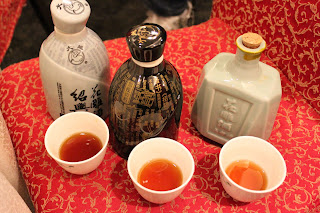Shaoxing rice wine - analysis in Vancouver
 Chinese rice wine, of which Shaoxing is the most famous variety, is in the top 10 most important ingredients in Chinese cooking, some claim it's second only to soy sauce. According to wikipedia, over 5 million Chinese live in the US and Canada. Yet there are not many places in North America, physical or online, where one can buy quality Shaoxing wine. Unless you live in a city with a large Chinatown or a Chinese supermarket like Ranch 99, you are out of luck. All the better for ChineseRiceWine.com, an Oregon-based online business that aims to popularize Shaoxing rice wine in the United States. Given my interest in the subject, the founder Scott Thurman, an American ex-Intel business development manager turned into Shaoxing rice wine guru, sent me a sample of his portfolio of three rice wines - a 5, 8, and 10 year aged, manufactured by Shaoxing Dayue Wine Co. Ltd of China. A hi-techy turned a wino is a kindred soul, so I promised Scott to put his babies through their paces and publish my report. Relative to the cheaper stuff sold at various asian markets that I reviewed previously, these are quite premium - $20, $30, and $40 respectively, and they come in beautiful jars. Last week, Rona and I visited her parents in Vancouver, which provided a perfect setting for a 4th installment of my Shaoxing wine series.
Chinese rice wine, of which Shaoxing is the most famous variety, is in the top 10 most important ingredients in Chinese cooking, some claim it's second only to soy sauce. According to wikipedia, over 5 million Chinese live in the US and Canada. Yet there are not many places in North America, physical or online, where one can buy quality Shaoxing wine. Unless you live in a city with a large Chinatown or a Chinese supermarket like Ranch 99, you are out of luck. All the better for ChineseRiceWine.com, an Oregon-based online business that aims to popularize Shaoxing rice wine in the United States. Given my interest in the subject, the founder Scott Thurman, an American ex-Intel business development manager turned into Shaoxing rice wine guru, sent me a sample of his portfolio of three rice wines - a 5, 8, and 10 year aged, manufactured by Shaoxing Dayue Wine Co. Ltd of China. A hi-techy turned a wino is a kindred soul, so I promised Scott to put his babies through their paces and publish my report. Relative to the cheaper stuff sold at various asian markets that I reviewed previously, these are quite premium - $20, $30, and $40 respectively, and they come in beautiful jars. Last week, Rona and I visited her parents in Vancouver, which provided a perfect setting for a 4th installment of my Shaoxing wine series.I love Chinese food in the Bay Area, LA (Monterey Park), New York (Chinatown), but in my experience, outside of China, Vancouver is the world capital of Chinese cuisine. Shanghainese food I know in the Bay Area (with the exception of the famous soup-oozing Xiaolongbao dumpling) is quite heavy, with lots of brown sauce that should in theory match Shaoxing wine. However, this particular restaurant served modified, more healthy Shanghainese - primarily seafood. As the restaurant was fairly new, they had not gotten an alcohol license yet. So we snuck the wines in and drank out of tea cups - color-wise they were indistinguishable from black tea - while keeping the bottles on a chair under the table. I felt naughty!
 |  |  |
 |  |  |
 |
Would these dishes match Shaoxing wine? Champagne - yes, Riesling? - oh yes! But Shaoxing? Determined to proceed with my study, I pushed on. The least expensive of the bunch - Poet's Inspiration, named after Lu You, a 12-th century warrior poet born in Shaoxing - a 5 year aged wine was eye-opening and my all-time favorite among any Shaoxing wines I'd ever tried. It was light, subtle and elegant, and the best match for the food. The night before, we had it with Maya's (mom-in-law's) amazing 5-spice pork shoulder (shown below), and the 5-spice + pork + wine definitely worked!

The two more expensive wines - Emperor's Own 8 and 10, were darker in color, thicker in texture, and stronger in taste, and perhaps suited a Chinese palate better, but not mine. Although Baya was initially taken aback by the unfamiliar lightness of the Poet's Inspiration, he eventually appreciated it. His favorite though was the 10 year aged. Though these wines are traditionally drunk warm, out of the scientific rigor we tried them cold as well - predictably they tasted better warm, except with spicy dishes where the heat of the wine exaggerated the heat in the food. Because of the spice, the wine and the amazing Kung Pao chicken (according to the owner, the chicken is softened by sitting in baking powder for 2 hours before cooking) didn't match. Only the crab fried in light batter and dipped into sweet and salty sticky oyster sauce, seemed to be a match in the right direction but still not quite getting there. I imagine heavier meat dishes, non-spicy, especially those cooked with Shaoxing wine would have been best. Alas, they were not served!
Our family reunion was all-the-better, more focused and more relaxed by the fascinating Shaoxing wine. And although we did not find the world's greatest food & Shaoxing wine match, we were so happy to try! Until next time, my search goes on.



Comments